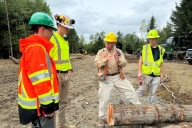You have /5 articles left.
Sign up for a free account or log in.
President Trump loves vocational training. Community colleges? Not so much.
Trump on Thursday appeared at the "Generation Next" White House forum alongside Charlie Kirk, a conservative campus activist who heads Turning Point USA. In between talking up tax cuts and his administration's work rolling back federal regulations, the president weighed in on the value of vocational training. And repeating a sentiment he expressed to a conference of conservative lawmakers last month, he again appeared to dismiss community colleges. As they did after his earlier remarks on those institutions, community college leaders said they showed the president was misinformed.
In the midst of answering a question from Kirk about tax cuts passed last year, Trump repeated an anecdote he tells frequently about a former classmate who was "not going to be Einstein academically" but could fix an engine or a motor blindfolded.
"But he’ll never be a student, nor did he want that kind of learning, that kind of whatever you want to call it," Trump said. "So we need vocational schools. Now, they call them, a lot of times, community colleges. I don’t think it’s an accurate definition."
The comment echoed a statement from February in which he complained to Republican lawmakers that many people don't know what a community college "means or represents" and suggested that "vocational" is a preferable term. Those earlier remarks prompted several leaders in the community college sector to complain that Trump had taken an overly simplistic view of the mission of those institutions and downplayed the significant role they have in training students for new careers even as they prepare others to move on to four-year colleges.
Community college leaders again urged the president to learn more about the work their institutions do.
“I would welcome an opportunity to speak with the president about the wealth and breadth of programs and services our 1,200 community colleges provide annually to millions of individuals," J. Noah Brown, the president and CEO of the Association of Community College Trustees, said in a statement Thursday.
And Eloy Ortiz Oakley, California Community Colleges chancellor, said he would be happy to clear up any misunderstanding the president has about the nation's community colleges.
"In California, half the students who graduate from California State University and nearly a third who graduate from University of California started at a community college," he said in an emailed statement. "Our students become doctors, engineers, diesel mechanics, firefighters, computer scientists, nurses and more as they move our state forward and become active participants in our democracy."
Before Trump's appearance Thursday, his daughter Ivanka Trump, a senior adviser to the president, and Labor Secretary Alex Acosta took part in a separate panel focused on education and careers. Ivanka Trump said the administration was focused on expanding alternatives to four-year degrees, including apprenticeships.
But even groups supporting that goal have seen the Trump White House take few concrete steps so far. After Trump's comments on vocational training last month, Andy Van Kleunen, CEO of the National Skills Coalition, said "talk is cheap" and that so far Trump's actions had weakened skills training.
"Unfortunately, to date, the president’s agencies have either called for deep cuts to work-force programs or they have refused to spend the training resources Congress has already given to them," he said in a statement to Inside Higher Ed last month.
Popularity on Campuses
Asked by Kirk, whose group aims to promote conservative activism on campus but has been secretive about its funding sources, what he would say to conservative students who feel "ridiculed and silenced," Trump dismissed the idea that he struggles with support on college campuses.
"I think the numbers are actually much different than people think. I think we have a lot of support. If they have one campus or two campuses that, we know what they are, it gets all the publicity," he said. "We have campuses where you have a vast majority of people that are, perhaps, like many of the people in this room -- you could call it conservative, you call it whatever you want -- but they’re people that want free speech. If you look at what’s going on with free speech, with the super left, with antifa, with all of these characters -- I’ll tell you what, they get a lot of publicity. But you go to the real campuses and you go all over the country or you go out to the Middle West [sic], you go out even to the coast in many cases, we have a tremendous support. I would say we have majority support."
Campus opposition to either his administration or conservatives was overstated, Trump said.
"I think it’s highly overblown," he said. "Highly overblown."
Even though those comments appeared to dismiss the oft-repeated complaint from conservatives that campuses aren't welcoming to their politics, Kirk rushed to concur with the president. He added, however, that his group often speaks to students who support the president but are too fearful to say so because of their campus's culture.
Survey data doesn't track opinions of Trump among college students in particular. But Brandon Busteed, who oversees Gallup's work on education and work-force issues, said via email that the organization's latest study on views of free speech among college students on four-year campuses showed that 66 percent of those students identify as Democrats or lean Democratic; 27 percent identify as Republican or lean Republican.
The group did not in that survey ask any questions about views of Trump. However, the latest Gallup survey numbers show the president has abysmal approval ratings among young people age 18 to 29. In a sample for Jan. 29 to Feb. 25, Trump had a 24 percent job approval rating among that cohort. Among respondents age 50 to 64, his job approval was almost twice as high at 46 percent.








